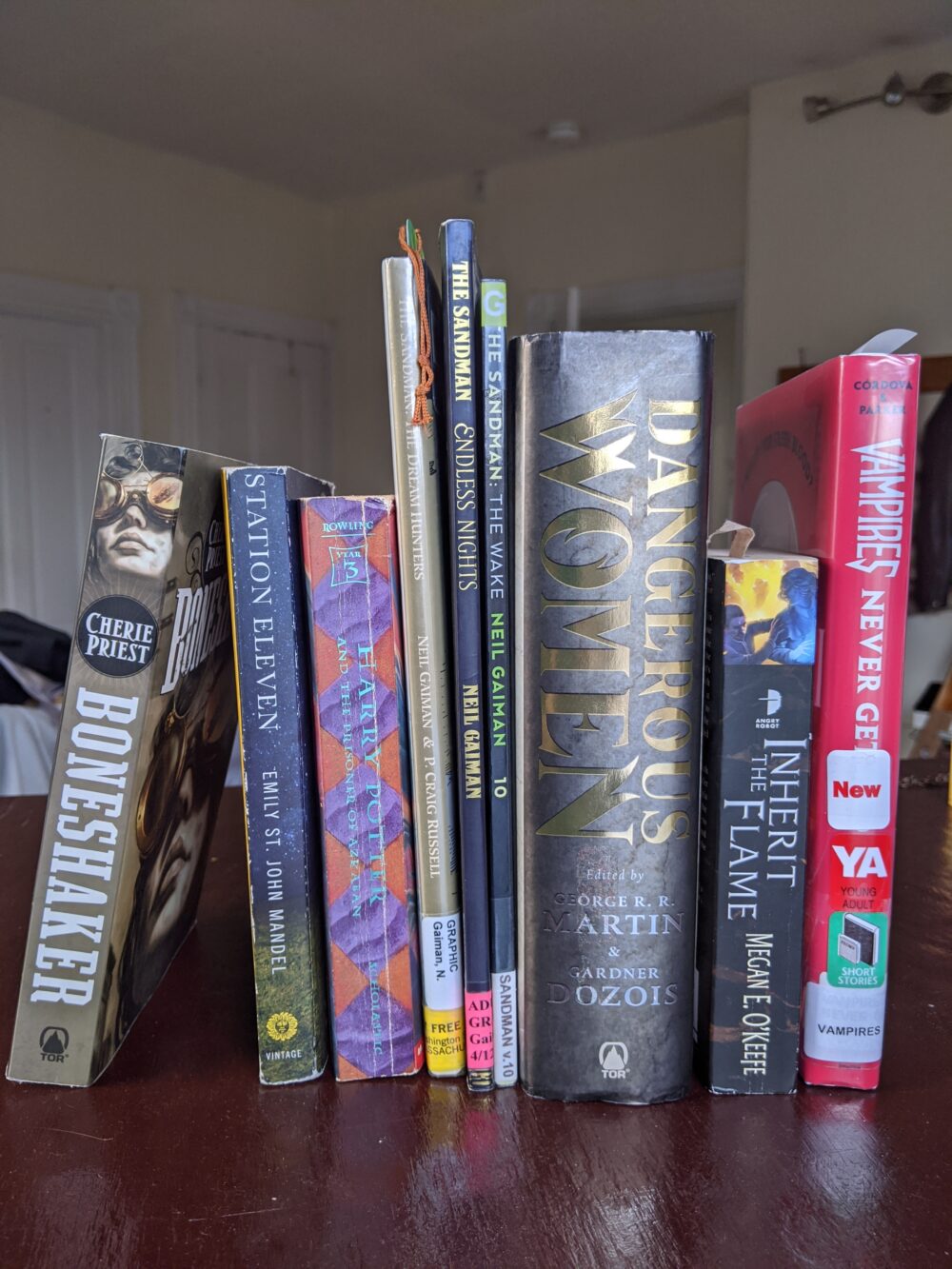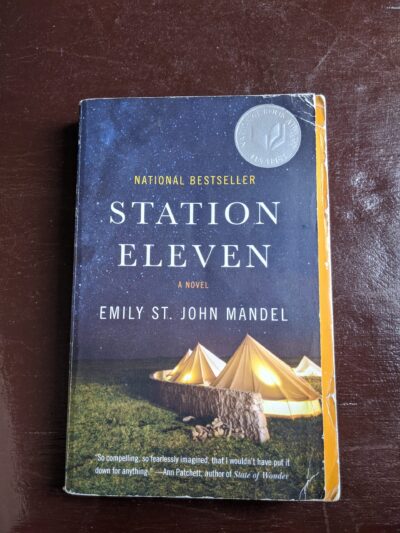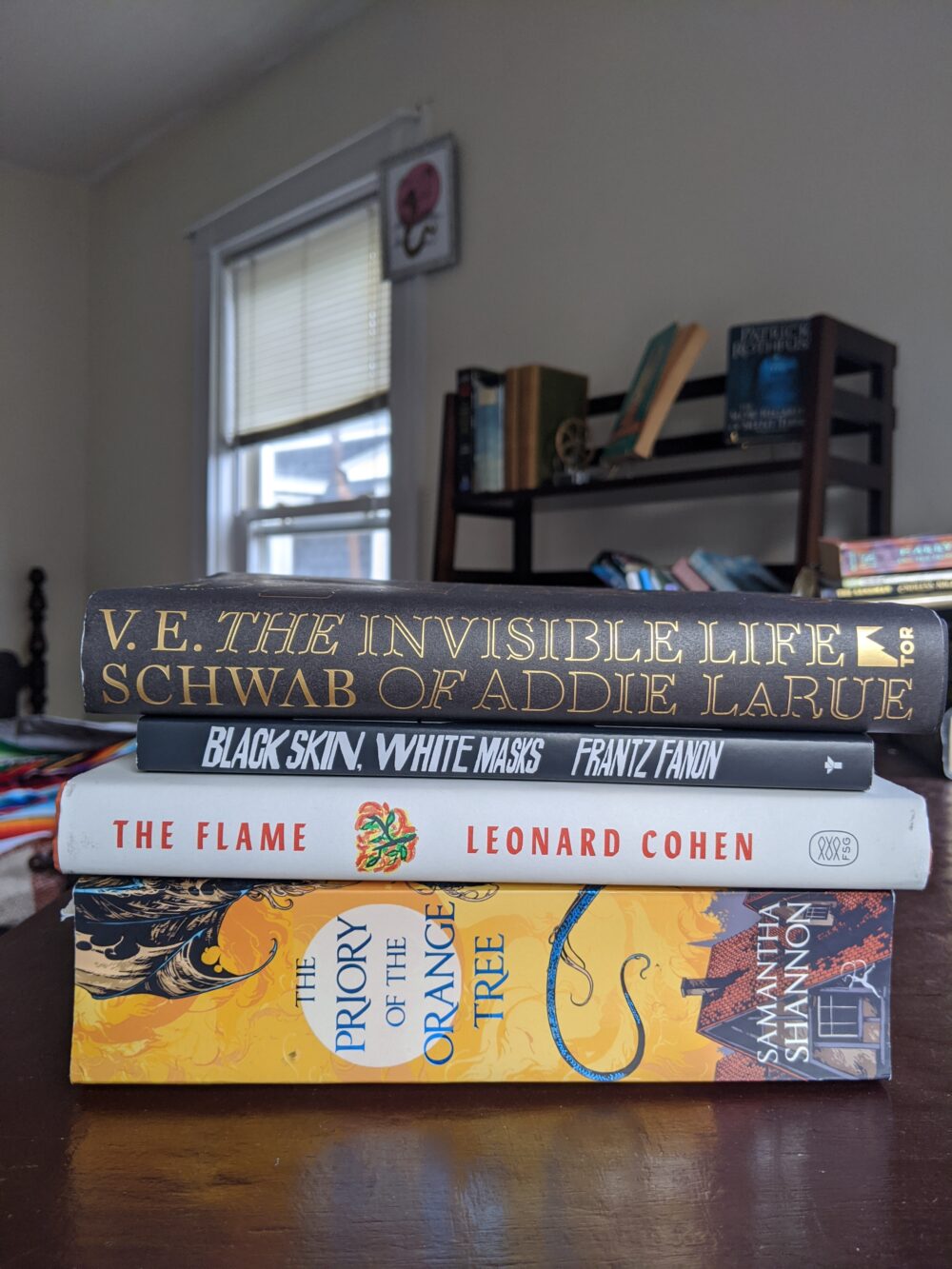
Books I did read this semester by Amber V. '24
I am literate if not literary
Previous me wrote in a blogpost that I “did not want to write about books,” but she was wrong. I love books. They are necessary all the time but even more so now. Sometimes we have to dip into other worlds to make our way through this one.
I used to be that kid who read during lunch and recess, in the hall and during class. Then in high school I took classes that I had to pay attention to, and somewhere along the way learned that respecting your teachers was a thing, and obviously reading while they taught was rude. Now I mostly read at night.
When I go to bed at eleven, this can last for hours, and I am actually cognizant of what I am reading. When I go to bed at three, it’s more of a bleary couple pages, but that’s ok. It’s about the habit. I would say it’s a small miracle this habit hasn’t died, but really it was a decision; I came in determined that I would not lose the important parts of myself to MIT, not all of them, not yet.
I made it my goal this year to not read shitty books. Not reading books I don’t like has been somewhat of a challenge for me, because I start books easily, and once I’m midway through something I feel obliged to finish. That was a great tactic back in middle school, when I had no taste anyway, and ample time. It hasn’t returned good results recently, though.
But this year I followed my gut, and more or less, it worked. I didn’t read as many books as I have in years past, but the ones I did read were richer. I really01 apart from this one a girl from the Netherlands gave me in a hostel in Spain, but that was an exception since it was a gift enjoyed02 And this other one about Vikings that I had to read because I was quarantined in an Airbnb in the suburbs of Phoenix and literally had no other books left. them.03 And this werewolf book that was just very bad.
So, because this is fun for me and may end you with a book rec or two, allow me to describe the books I’ve read this semester.

Boneshaker
by Cherie Priest
Genre: Steampunk / historical fiction, adult but with a flavor of
YA.04
Young adult -- think Hunger Games, John Green books, that type of stuff.
Synopsis: A mad scientist unleashes a poisonous yellow gas on 1800s Seattle. Anyone who breathes it is liable to become a zombie, so the citizens wear gas masks and live in tunnels. There are cyborgs and steamships and everyone has wicked steampunkish guns. The mad scientist’s son and his widow live outside the city, and the son ventures in to find traces of his father. His mother knows her son won’t survive alone, so she goes to rescue him.
Thoughts:
- The masks are kind of uncanny in our times, since they’re so commonplace to the characters but were very much not commonplace to the author at the time that she wrote this.
- I really liked the mother-son relationship going on.
- The story is told in both the mother’s point of view and the son’s, and you can feel the difference between them. His narration feels younger, more YA, while hers feels more like fantasy: she’s tougher, less tuned in to her feelings, while he is a kid who frequently feels angsty or overwhelmed.
- There’s a vast array of characters which are great fun and fit nicely into 350 pages. The women are all powerful, which is great — all books should be this way. The people of color, however, seemed to typically be less talkative or less intelligent than their white counterparts. Side characters were generally introduced in groups of 2-4, and these groups would consist of a talkative white guy and much more quiet (or mute) people of color. I don’t think Priest did this purposely, though. There are also competent and respected minority characters.
- I loved how Priest handled the tall, dark, and nerdy villain — think Severus Snape, or VE Schwab’s Holland, or, in this case, a mad scientist with a charismatic streak. Sometimes when characters like this have a lot of dialogue it makes them seem weak, but this villain’s dialogue made him stronger.
All Systems Red: Murderbot Book One
by Martha Wells
Genre: Sci-fi novella
Synopsis: a robot, which calls itself ‘Murderbot,’ is owned by an intergalactic company and hired out as a bodyguard to a group of scientists exploring a new planet. The Murderbot gains consciousness and a considerable amount of sass. Meanwhile, a mysterious group begins to sabotage the scientists’ expedition.
I read this: on the plane ride to Cambridge. It’s 150 pages and addictive.
Thoughts:
- My friend Keiko has been recommending this book to me for over a year, but it took me forever to pick it up. When I finally saw it in a bookstore and took it home, I found that oh god this book is amazing. It was. So good. The tone is so good. The plot unfolds and gains tension within 150 pages. The characters have actual, subtle development and nuance and there is so much diversity. The way the Murderbot thinks and grows is so very accurate, so multi-dimensional, so much better than a YA ‘I wish I had freedom’ style robot.
- I haven’t read a lot of modern sci-fi, but this one did a great job of making a world that felt modern, not what someone in the 1960s thought the future would be like. There are big corporations and social media and TV series.
- I’m not sure what to talk about without spoiling things but god damn. Read this book.
- Happily this is a three-book series, which means that whenever I finish other books and/or actually motivate myself to go to a bookstore, I will have more.

What a pretty cover!
Station Eleven
by Emily St John Mandel
Genre: Literary fiction in a dystopian world
Synopsis: Apocalypse came in the form of a deadly pandemic, and now the world is reduced to pockets of civilization living in abandoned cities. A troupe of actors perform Shakespeare, travelling from town to town, and run into trouble when they perform for a cult.
Thoughts:
- This book is gorgeous. The prose is spectacular.
- This book was written in 2011, when the concept of a worldwide virus was very much fictional. There are scenes that are chilling in how accurately they predict human behavior: long lines at the grocery store, a shortage of guns. But there are also scenes that we know, with the mixed blessing of hindsight, are unrealistic.
- I do not usually enjoy dystopia, and I also don’t usually enjoy literary fiction that describes normal (though rich) people being sad in their daily lives. This book is pretty much comprised of both, but Mandel’s writing and character development makes me love the sad rich characters and the dystopian world. I really, really loved the world.
- Many characters are painted with just a few brushstrokes, a detail here and a line of dialogue there, which leaves you wanting so much more.
- Favorite read of the year by a long shot. It was great to climb in bed and read a few precious pages, then sleep before I got too tired to appreciate the writing.
Entering October
Harry Potter and the Prisoner of Azkaban
by JK Rowling
Genre: YA/MG portal fantasy, I suppose. If ‘magic school a la Harry Potter’ is not its own genre at this point.
Synopsis: This is the Sirius Black one, ft dementors and Buckbeak and Remus Lupin and Scabbers the rat.
Thoughts:
- SPOILER WARNING — skip this section if you wish to keep your blissful ignorance intact. In particular the twists and turns of the third book will be revealed.
- The Harry Potter books have been comfort-reads for me for years. Whenever I feel too emotionally drained to invest myself in the plight of some new fictional characters, or too mentally drained to focus on plot points, I turn to Harry Potter.
- Like many people, I am angered by J. K. Rowling’s
recent behavior,05
ie, using her platform to spread transphobic content
and I have mixed feelings on how to talk about the Harry Potter series now. I haven’t funneled money into the franchise for years — I had strong opinions on Cursed Child — and I’m glad that the fandom took initiative to divorce from JKR and then look critically at the series.
- I enjoyed The Great Gatsby, even though Fitzgerald wrote in a crooked Jewish lawyer whose emotions were portrayed literally through the movements of his nose. I’m used to separating bigoted art from a bigoted artist. But it’s one thing for me to say Gatsby is all right: I am Jewish, I haven’t suffered personally from anti-Semitism, and the book was written nearly 100 years ago. It’s different for me to excuse Rowling, since transphobia hurts a lot of people right now.
- I could write essays on the issues around this series — did ya know that there are more magical creatures with speaking roles than there are people of color? — but that’s not what this blog post is about (and there are other essays out there written more eloquently than I could do). So I’ll just make a few more notes. Just a few.
- It’s interesting that the fandom is now noticing the bigotry within this book.
- As a kid I was angry at the animal cruelty that happens in every Transfiguration class. Turning hedgehogs halfway into pin cushions and then sticking them with pins? Christ. I remember telling my teachers, and they’d nod understandingly, and explain, “these books are fiction.” So I stopped pointing out flaws — the classism I noticed as I grew older, the injustices against non-humans that don’t seem to bother Harry — and merely catalogued them in the back of my mind.
- But the world of Harry Potter has always been a weird and fucked-up place. There was never a time I didn’t think it was cruel — to animals, to Snape, to Dudley and Aunt Marge, to Dobby. The house-elves, the centaurs and merfolk and giants, the goblins.06 I don’t think the book (not movie) goblins are Jews though -- I don’t think Jews in Europe were billed as bankers that were fair and trustworthy, completely neutral to politics (recall they bought a Firebolt on behalf of Sirius Black), cleanly removed from government, and taking advantage of nobody. The Basilisk, Filch, Errol the decrepit old owl, blast-ended skrewts, Moody’s spiders. The depictions of werewolves that aren’t Lupin as savage, and giants as stupid. The fatphobia against characters you aren’t supposed to like. The weird classism that always crept in.
- also, Severus Snape, of greasy hair and crooked teeth and long, hooked nose, gets his nose mentioned in nearly every scene of Prisoner of Azkaban. And then — in the moment where Harry reveals the Marauder’s Map — his nose quivers in triumph. I was so excited when I read that line. Eight-year-old me was sure that Snape was a Jew and now, after being cultured in subtle nods to anti-Semitism, I had proof!07 was this purposeful, malicious anti-Semitism? I don’t know. I don’t think so -- I’d like to think this is just something in the writer’s subconscious, that villains have big noses, which she never thought about too critically. I do think that someone should have caught it before it went to print. Representation!08 okay, so one could argue that the old pure-blood wizard families in England are probably not Jewish, in which case Eileen Prince, Severus Snape’s mother, was probably a gentile. However, we have no evidence on Tobias Snape. Totally coulda been Jewish.
- okay but despite all that, I must say that this series is close to my heart. As a kid, I cried when important characters died. In middle school I fell into a strange and very niche section of fandom, where I wrote bad fanfiction09 my little sister says I should clarify that this fanfiction was not Drarry, and indeed it was not. about the Death Eaters. Every time I re-read a HP book, I think of thirteen-year-old me, dressed all in black with horribly bleached hair, and I wonder what she’d think of me, and how much I have changed.
- The writing has so many adverbs, and lo and behold they work. There’s an adverb after nearly every dialogue tag, so much that some become more of a character trait than a description of speech — Lupin said mildly. But in my opinion, it doesn’t weaken the writing.
- I love the sense that there are stories on top of stories here.
- My notes after I finished, one Thursday at 3 am, read:
- why is Hogwarts a police state where you can’t be in the halls on a weekend in broad daylight
- The first time you read a Harry Potter book, you’re like “wow how cool, what happened, did they abuse that animal?” And the second time you’re like “Woww, that’s why that happened, holy shit there are so many hints and clues here! And they did hurt that animal!” Then by the fifth time you’ve memorized all the lines, and only tiny bits pop out, things you never noticed before. I do not see Wolfstar10 Sirius Black and Remus Lupin but I can see how people might, the third or fourth time around, when you’re trying to see more between the lines you know so well.
- it’s like everyone has less space now, less time, because I’ve memorized every scene and every line they’ve got.
- Filch searched the dungeons for Sirius Black. A squib.11 someone who can’t do magic. Alone. Searching for a wizard mass murderer. Anyway.
- Dumbledore would’ve let Buckbeak die had he not needed him to free Sirius. No way did he plan for Sirius to get captured.
- Also, why does trial by jury not seem to be a thing? No witness testimony? This is a medieval fucking system. It’s supposed to be unjust, and frustrating, and the characters don’t like their government, either. But still.
- Hagrid is the greatest fucking human being, so true and so noble. He’ll be with Buckbeak as he dies. He tells Harry and Ron to be nice to Hermione.
- Also, Hagrid drinks all the time, and I never noticed this before. Drinking isn’t a problem, per se, except it’s used in a deragatory way here, he’s the only one who does. Maybe showing this isn’t classist but it sure as hell ain’t classy.
- Love how quickly Sirius is developed, how he and Lupin have such deep understanding. Old friends. The presence of the past is so strong in this book.

wow, that was… that was long. Here is an owl with fluffy feet.
Sandman
by Neil Gaiman
Genre: Graphic novels; technically I think it’s horror, but I’d describe it as speculative fiction: more fantasy than paranormal, and more action-and-adventure than Haruki Murakami.
Synopsis: This is a 10-volume series about the Sandman, who controls the realm of Dreams, and his encounters with people in the waking world. It is a wild time, sometimes horror and sometimes just weird.
Thoughts:
- This is the series that made Neil Gaiman into Neil Gaiman. If you haven’t heard of him, you might not know what I mean, so I’ll try to explain: Gaiman has a legacy. They say his writing is like poetry, and that he re-imagines myth and fairy-tales as no one else can. And honestly, before reading Sandman, I didn’t really get why. Coraline and The Graveyard Book were brilliant, and I liked American Gods, but I didn’t dig Stardust or Neverwhere, and all in all, I wasn’t sure why my favorite authors seemed to worship the ground Gaiman walked on. But then I read Sandman. And it is good.
- It like opens up a world that is, for lack of a better word, true. That’s what all the people who write introductions for Neil Gaiman say (striving for their very best, most wordy prose, how prettily they write their praise, aren’t they brilliant writers too?).
- It’s about dreams, and finding magic in mundane life. There is a comic-con except for psycho killers, and a tavern at the end (or the intersection) of worlds, where Egyptian gods and centaurs and businessmen tell stories.
- In this series, I didn’t like the main character at first. He was a tyrant. But he changes, and watching that change unfold was lovely. By the end, I loved him and all his flaws.
Dangerous Women
Anthology edited by Gardener Dozois and George RR Martin
Genre: Fantasy!
Synopsis: The prompt was simply to write about ‘dangerous women.’
Thoughts:
- It’s hard to sum up this book as a whole, since each short story is so different. The writers followed their prompt to a T, but some took “dangerous women” to mean “nuanced, powerful female protagonists,” and others heard “women who are dangerous, and evil, because of their sexuality.”
- There’s a woman in an oppressed fantasy race who has the audacity to seduce the hero, a male citizen of the oppressors, and use him in her nonviolent plot to free her people — and she is billed as evil. In a different story, there’s a woman who gets murdered by the male hero because he thinks she has evil plans in mind. These stories remind me that while I love the fantasy genre, and I love how far it has come, there’s still sexism to root out here.
- I’m only partway through, but so far I particularly enjoyed:
- Brandon Sanderson’s story, epic fantasy, in a world that is characteristically complex and with well-developed mechanical magic. I loved the mother-daughter relationship, and how the arc of this story felt big and grand despite being concluded in roughly fifty pages.
- Megan Lindholm’s story, magical realism, about a woman with dementia whose children are trying to bring her to a nursing home. It’s beautiful and sad, and Lindholm’s dialogue is brilliant.
- Lev Grossman’s story, fantasy, about students at Brakebills, a school for magic that is more Ivy League than Hogwarts. Everyone is witty, the prose is fun, and Grossman’s caricatures of different types of nerdy Ivy students are cutting and on-point.
- Megan Abott’s story, thriller, was creepy and clever. It’s about a young married couple whose toddler goes missing, and the mystery is developed in twists and turns that feel true to the characters. I was thinking about this story for a while after I finished.
Ignite the Flame
by Megan E. O’Keefe
Genre: Fantasy! With a steampunk twist.
Synopsis: Book three in a series. Two conman, an ex-gang member, and an ex-police chief defend their city from imperial conquest.
Thoughts:
- The magic is based on sel, which is a floating gas that some people can sense, levitate, and explode.
- This series is really fucking good, where the friendships are close and tender, and there is a big emphasis on characterization. This is, as I’ve said, book three, which means that romances have developed — without taking center stage, or making anyone act foolishly — and friendships have formed and burned. It’s great.
- I love how everyone is not morally shady– the good guys mostly believe that killing people is wrong. They go out of their way to not mutilate or kill enemy soldiers, and they do it in a way that isn’t annoying.
- One of the main characters is held captive in the beginning, and is subject to many painful tortures, which is wild because it’s a real throwback to something I was writing when I first started this series, years ago.
- Overall I think this series is underappreciated and deserves lots of love.
Vampires Never Get Old
Anthology edited by Zoraida Córdova and Natalie C. Parker
Genre: Short stories, mostly YA, about vampires
Synopsis: See above, plus lots of diversity. Have you ever wanted to read about queer vampires in the Southwest?
Thoughts: I didn’t know I did — I bought this book for the VE Schwab story at the end — but boy, I am digging this so much.
- I’m not finished yet, but so far my favorites are:
- Rebecca Roanhose’s story about an outcast gay teenager in a small Southwestern town. I’ve read Roanhorse before, so I came in expecting this to be good, and I was not disappointed. I love her sense of place here, the vibes of a haunted diner and a broken jukebox and pretty cowboy vampires.
- Julie Murphy’s story about a heavyweight cheerleader in middle-of-nowhere Texas who secretly slays vampires — but then she sits next to a pretty girl with pointed teeth on the bus ride back from a football game. Parts of this story felt rushed, but the main character’s development was excellent, and the high school vibes are strong.
- Heidi Heilig’s story, set at the turn of the 20th century, about a doctor-in-training who steals fresh corpses from graves in order to afford college. He is a trans man in a very close-minded world, which Heilig handles wonderfully, and the story takes place in a graveyard, which has a great atmosphere. You can imagine where a vampire might come in.
- Laura Ruby’s story, which I would describe as “trippy, atmospheric speculative fiction,” is set in a zoo in a dystopian world where no one has enough water. It was weird and creepy, and at times confusing, but I loved the writing style and the unreliable narrator.
- I haven’t reached Schwab’s story yet, it’s at the very end. I’m saving that one for tonight.
Wow, that was so very long. Kudos to everyone who got to the end! I hope you’ve stumbled across a title or two that looks interesting, or been inspired to read fantasy, or are working on your own hot takes on Harry Potter.
Happy reading this break, everyone!

The books I’m excited to finish, re-read, or, in the case of Addie LaRue, to begin.
- apart from this one a girl from the Netherlands gave me in a hostel in Spain, but that was an exception since it was a gift back to text ↑
- "And this other one about Vikings that I had to read because I was quarantined in an Airbnb in the suburbs of Phoenix and literally had no other books left. back to text ↑
- And this werewolf book that was just very bad. back to text ↑
- Young adult -- think Hunger Games, John Green books, that type of stuff. back to text ↑
- ie, using her platform to spread transphobic content back to text ↑
- I don’t think the book (not movie) goblins are Jews though -- I don’t think Jews in Europe were billed as bankers that were fair and trustworthy, completely neutral to politics (recall they bought a Firebolt on behalf of Sirius Black), cleanly removed from government, and taking advantage of nobody. back to text ↑
- was this purposeful, malicious anti-Semitism? I don’t know. I don’t think so -- I’d like to think this is just something in the writer’s subconscious, that villains have big noses, which she never thought about too critically. I do think that someone should have caught it before it went to print. back to text ↑
- okay, so one could argue that the old pure-blood wizard families in England are probably not Jewish, in which case Eileen Prince, Severus Snape’s mother, was probably a gentile. However, we have no evidence on Tobias Snape. Totally coulda been Jewish. back to text ↑
- my little sister says I should clarify that this fanfiction was not Drarry, and indeed it was not. back to text ↑
- Sirius Black and Remus Lupin back to text ↑
- someone who can’t do magic. back to text ↑